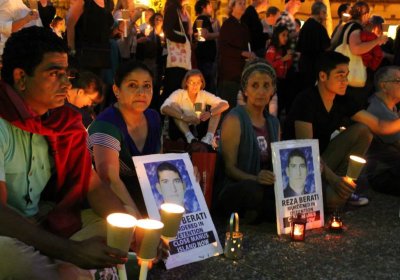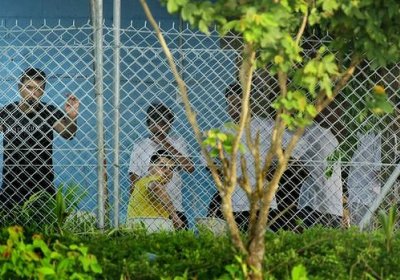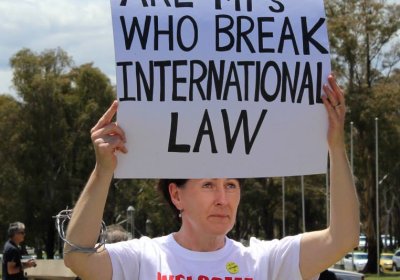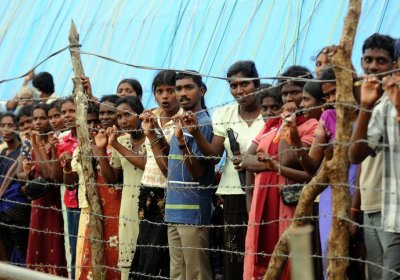A former welfare worker at the Nauru refugee detention camp says the July 19 riot that razed most of the Topside compound was an “inevitable outcome” of a “cruel and degrading policy”, in a new book released last week.
The Undesirables by Mark Isaacs follows several big whistleblower revelations that have come from Nauru since the camp was re-established by then-PM Julia Gillard in August 2012.
Jay Fletcher
The federal Coalition government is set on a path of unprecedented cuts to public services; Medicare is under threat, as are workers' penalty rates. Added to this is the large-scale selling out of action on climate change along with important natural environments, such as forests and the Great Barrier Reef, to make way for destructive mining and logging industries.
Two important things were revealed when immigration minister Scott Morrison was finally forced to admit he had been wrong about most of the facts when one man was killed and at least 70 others were injured on Manus Island on February 16.
The first was that asylum seekers who rang and messaged advocates, supporters and friends in Australia in a panic over the outbreak of violence, saying that G4S security guards and angry locals were brutally attacking dozens of people, were telling the truth.
The consequences of the inhumane policies by successive Coalition and Labor governments to make life as unbearable as possible for asylum seekers are unfolding on Papua New Guinea’s Manus Island.
Immigration minister Scott Morrison has circumvented the Senate block of Temporary Protection Visas (TPVs) by making use of a different type of visa — Temporary Humanitarian Concern visas (subclass 786) (THC).
Labor and the Greens blocked Morrison’s attempt to reintroduce TPVs in December when they voted it down in the Senate. Morrison initially tried to cap permanent protection visas in response, but was later forced to lift the cap.
As a 65-year-old Afghan Hazara man fights to avoid deportation, refugee rights advocates grow increasingly alarmed by reported “round ups” of hundreds of asylum seekers who are being threatened with imminent deportation.
Immigration minister Scott Morrison confirmed last month that the government was re-detaining people who had been denied refugee status and have apparently exhausted their appeals. Refugees reported from detention centres across Australia that those who have been “screened out” were being told to pack up and prepare to be removed.
Sydney’s Botany Bay was named by Captain James Cook while he was investigating this “great Southern continent” for the British empire in 1770. His exploration led to the First Fleet’s settlement in the area on January 26, 1788, and the beginning of 226 years of massacres, dispossession and abuse of the land’s first people.
So the graffiti discovered along the western shoreline of the bay reading “Fuck Australia Day, no pride in genocide” and on the front of Captain Cook’s heritage cottage in Melbourne labelling January 26 “Australia’s shame” had a symbolic point to their messages.
It has been a long and horrifying two months for refugees and asylum seekers seeking protection in Australia. Many new directives, plans and an increasingly brutal border control regime have led to a mounting crisis that legal experts are increasingly referring to as criminal.
Here are five ways the government have made the treatment of asylum seekers worse.
CLOSING DETENTION CENTRES IN AUSTRALIA TO EXPAND OFFSHORE
Refugee rights advocates spent much of this year dreading the election of the Tony Abbott government and its predicted fallout for those seeking protection in Australia. What can they now expect in 2014?
As a mother and her baby fight to avoid the “rat-infested” Nauru refugee camp, a Fairfax-Nielsen poll showed half of Australian voters disapprove of the Coalition government's refugee policy. The poll also showed Prime Minister Tony Abbott has come to the end of what has been described as the shortest “honeymoon period” of a PM in history. Abbott's popularity took an unprecedented dive — with a personal approval rating of 1%, believed to be fuelled by his attitude to the “diplomatic stand-off” with Indonesia over substantial spying allegations.
Immigration minister Scott Morrison reintroduced temporary protection visas (TPVs) on October 18 in a two-page “regulation” that amends the Migration Act and strips many rights and protections for refugees in Australia.
Morrison said the move was part of the government's “border protection policy” and aimed to “discourage” people from making “dangerous voyages to Australia”.
The opening session of the new parliament in Canberra next month will be met by a national convergence of refugee rights activists and campaigners.
- Previous page
- Page 4
- Next page











